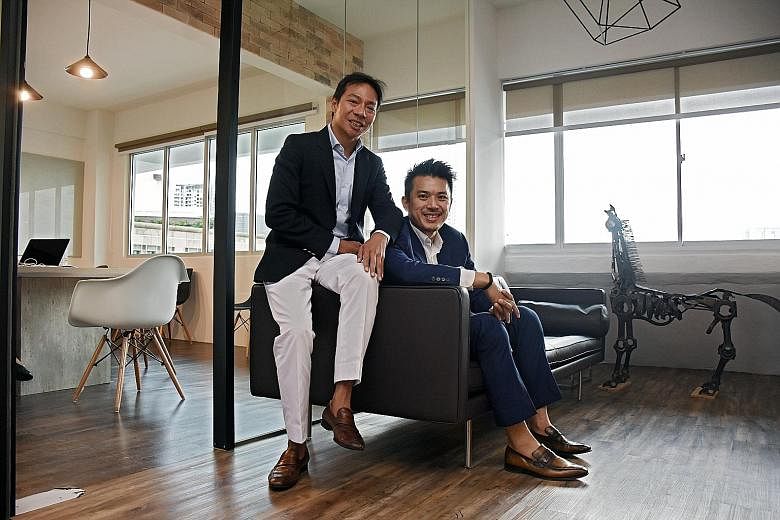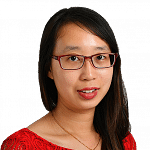An eye-popping beauty parlour bill helped to convince businessman Nelson Loh, 38, to enter the lucrative aesthetics industry.
He co-founded Novena Global Lifecare Group in 2010, along with his 39-year-old cousin Terence.
Both former bankers, the two men - who say they are as close as brothers - went into private equity together before venturing into health and wellness.
Mr Nelson Loh told The Straits Times: "I pay my mum's aesthetic bills when she visits beauty parlours and aesthetics doctors.
"I couldn't believe that every visit was $3,000 to $5,000. That didn't sound right. That was how we started and that was why we had this disruptive craving."
Since then, the Lohs have set out to make money by being industry mavericks - for example, by shaving profit margins to win over new customers with cheaper services.
Novena's regional healthcare and aesthetics portfolio focuses on predictive and preventative health treatments, such as medical screenings, DNA testing and wellness services. Brands include the PPP Laser Clinic chain, recently renamed Novu Medical Aesthetic.
The group is active in mainland China, Hong Kong, Taiwan, South Korea and Malaysia, and also has toeholds in Indonesia and India. Mr Terence Loh said Cambodia, Myanmar and even Spain are in his sights.
Group turnover last year was reportedly US$50 million (S$67.8 million), about half of which came from the Chinese market - with South-east Asia, led by Singapore, making up the remainder. The Lohs aim to grow their revenue to 10 times that sum by 2020.
To that end, they are eyeing a listing on the Taiwan Stock Exchange (TWSE) at some point this quarter and hope to raise US$150 million in the initial public offering.
Said Mr Nelson Loh: "Whether for investors or markets, I think the healthcare sector is actually very, very advanced in Taiwan, in terms of the research, in terms of technology. If you look at healthcare companies, biotech companies, they command a much better premium in Taiwan."
But the point is not simply to accumulate clinics in diverse markets, the cousins said. Rather, their end game is to build a database of clients that can be monetised.
As Mr Terence Loh explained: "One example of how we expand in Malaysia... is that we've actually acquired a chain of GP (general practitioner) and dental clinics. To us, it's a point of service, a point of database.
"So the clinics we have acquired are the ones that have existed for more than 20 years - three generations or four generations, the family has been going to the same clinic. And this is the database that we want."
Mr Nelson Loh, who called the group's strategy "database-driven", elaborated: "You know that they (patients) always come in. Then the question is about conversion, converting them into the preventive medicine group, converting them into the aesthetics field."
For instance, finding out "how you can help the parents be better parents by engaging their children responsibly - that's part of DNA (testing) as well", said Mr Terence Loh.
He added: "So we're talking about the whole life cycle, starting from the beginning. Post-birth, look at women - post-natally, they suffer from hair loss, they suffer from weight gain and pigmentation as well. So this is part of the whole anti-ageing, the whole maintenance that comes in."
Meanwhile, strategies to cut costs and attract customers with lower price points include axing doctors from the field of medical aesthetics, and manufacturing their own equipment so that they are not at the mercy of high overheads.
Said Mr Terence Loh: "If you understand aesthetics, most of them are GP doctors - (but) there's actually no specialisation at all required." Even though doctors have traditionally been at the core of the healthcare industry, the cousins believe that anyone can be taught to use anti-ageing or wellness tools.
He added: "A lot of it is actually very equipment-based... We realised that a lot of doctors actually are (held to) ransom by equipment manufacturers, in a sense."
The Lohs said manufacturers constantly roll out slight tweaks to industry equipment, forcing clinics to fork out for the latest upgrades. In response, they set up shop in South Korea, making equipment exclusively for their own clinics.
The cousins entered the aesthetics and wellness space because they were looking for a sector with an offline component that could survive the rise of e-commerce.
Said Mr Nelson Loh: "The healthcare industry is something that we knew will be here to stay... But because we're not doctors (and) we don't have that much money to build hospitals, we asked ourselves, which area of the healthcare space is somewhere that we can differentiate and have less of a disadvantage."
But the Lohs also see themselves as carrying out a mission to bring wellness services to the masses.
"We want to make aesthetics, lifecare, genome and DNA testing accessible to everyone. Everyone should be able to afford it," said Mr Nelson Loh. "It should not be the privy of, as it used to be, the upper classes or the more well-off. People should not be limited by their means."


